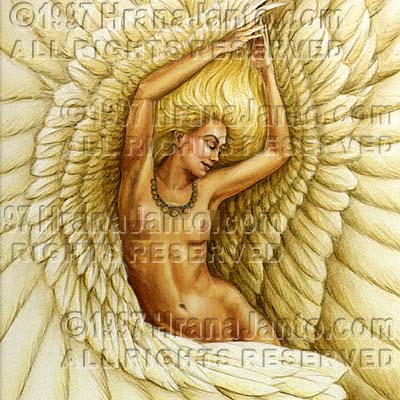 |
|
|||||
PREVIOUS | NEXT | A,B,C, D,E, F,G,H,I, J,K,L,M, N,O,P,Q, R,S, T,U,V,W,X,Y,Z | Help | ALL | INDEX
| Freya from Goddesses and Heroines |
Exerpt from Goddess & Heroines by Patricia
Monaghan [Used by permission. This text is NOT included in the Goddess Oracle] |
Far from the ancient Near East, home of the lustful warrior Anat, we find a goddess who is virtually her double: a Scandinavian mistress of all the gods who was also the ruler of death. Leader of the Valkyries, war's corpse-maidens, this goddess was also the one to whom love prayers were most effectively addressed.
The goddess who gave her name to the sixth day of our week, Freya was one form of the "large-wombed earth," another version of which her people called Frigg the heavenly matron. Here was how Freya appeared to her worshipers: the most beautiful of all goddesses, she wore a feathered cloak over her magical amber necklace as she rode through the sky in a chariot drawn by cats, or sometimes on a huge golden-bristled boar who may have been her own brother, the fertility god Frey.
When Freya was in Asgard, the home of the deities, she lived on Folkvangr ("people's plain") in a vast palace called Sessrumnir ("rich in seats"). She needed such a huge palace to hold the spirit hordes she claimed on the battlefields, for the first choice of the dead was hers, with leftovers falling to Odin. Like Persephone, the Greek death queen, Freya was also the spirit of the earth's fertility; like Persephone too, Freya was absent from earth during autumn and winter, a departure that caused the leaves to fall and the earth to wear a mourning cloak of snow. And like Hecate, an alternate form of Persephone, Freya was the goddess of magic, the one who first brought the power of sorcery to the people of the north.
Despite her connection with death, Freya was never a terrifying goddess, for the Scandinavians knew she was the essence of sexuality. Utterly promiscuous, she took all the gods as her love-including the wicked Loki, who mated with her in the form of a flea-but her special favorite was her brother Frey, recalling Anat's selection of her brother Baal as playmate. But Freya had a husband, too, an aspect of Odin named Odr; he was the father of her daughter Hnossa ("jewel"). When Odr left home to wander the earth, Freya shed tears of amber. But she soon followed Odr, assuming various names as she sought him: here she was Mardol, the beauty of light on water, there Horn, the linen-woman; sometimes she was Syr, the sow, other times Gefn, the generous one. But always she was "mistress," for that is the meaning of her own name, and a particularly appropriate double entendre it proves in her case.
| Back to TOP | Published by Llewellyn, copyright 1997. Used by permission of the author. |
![]()